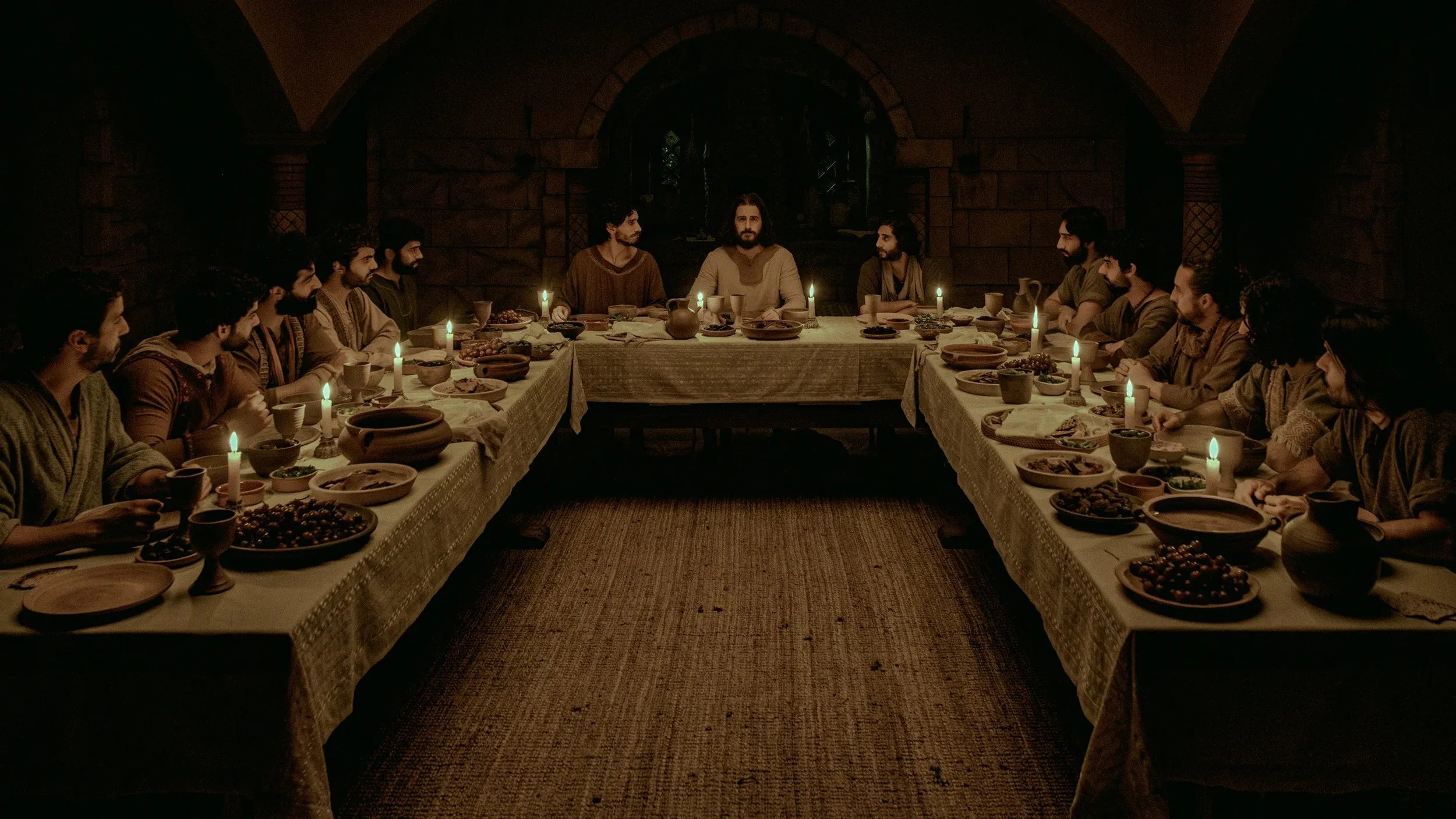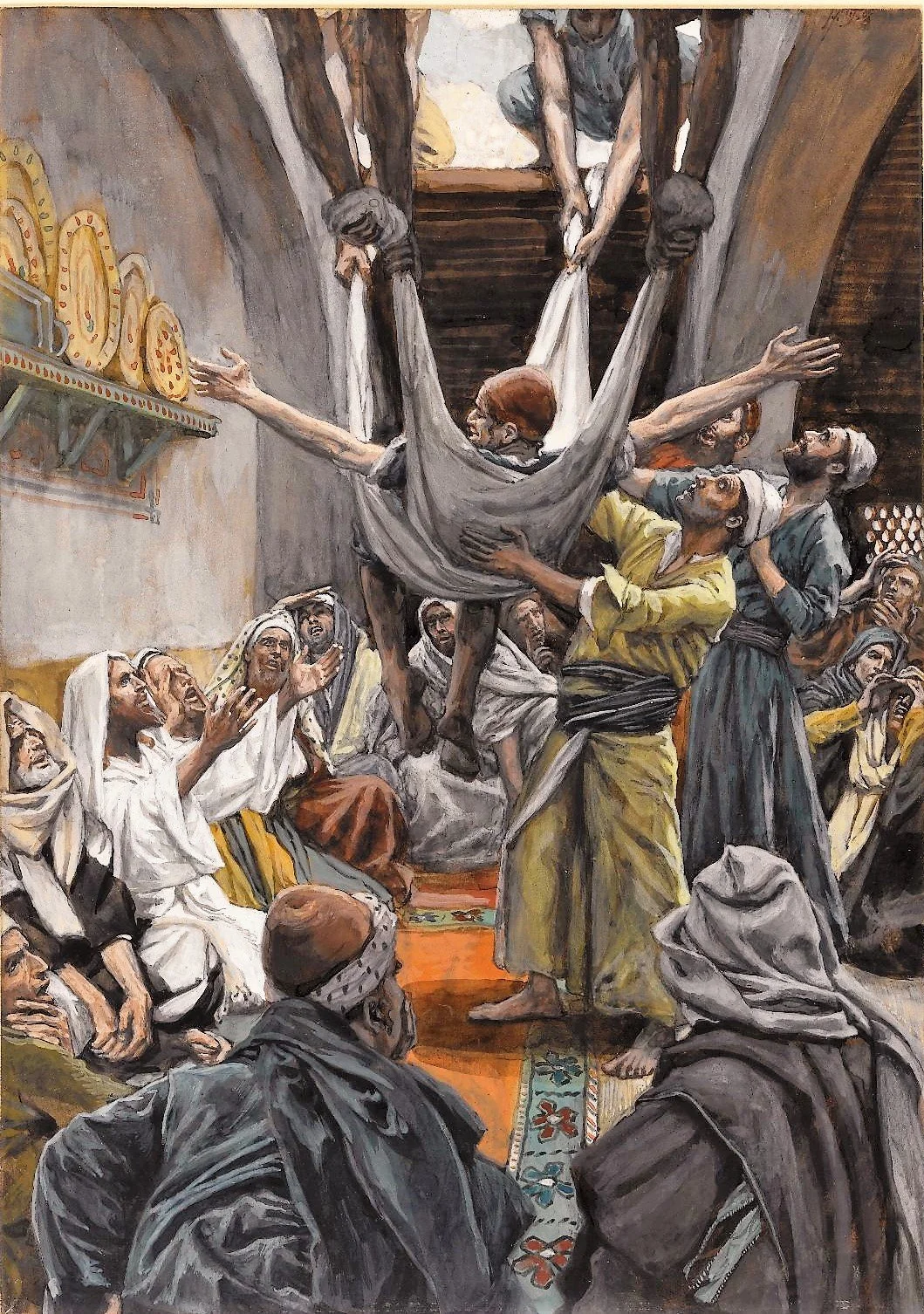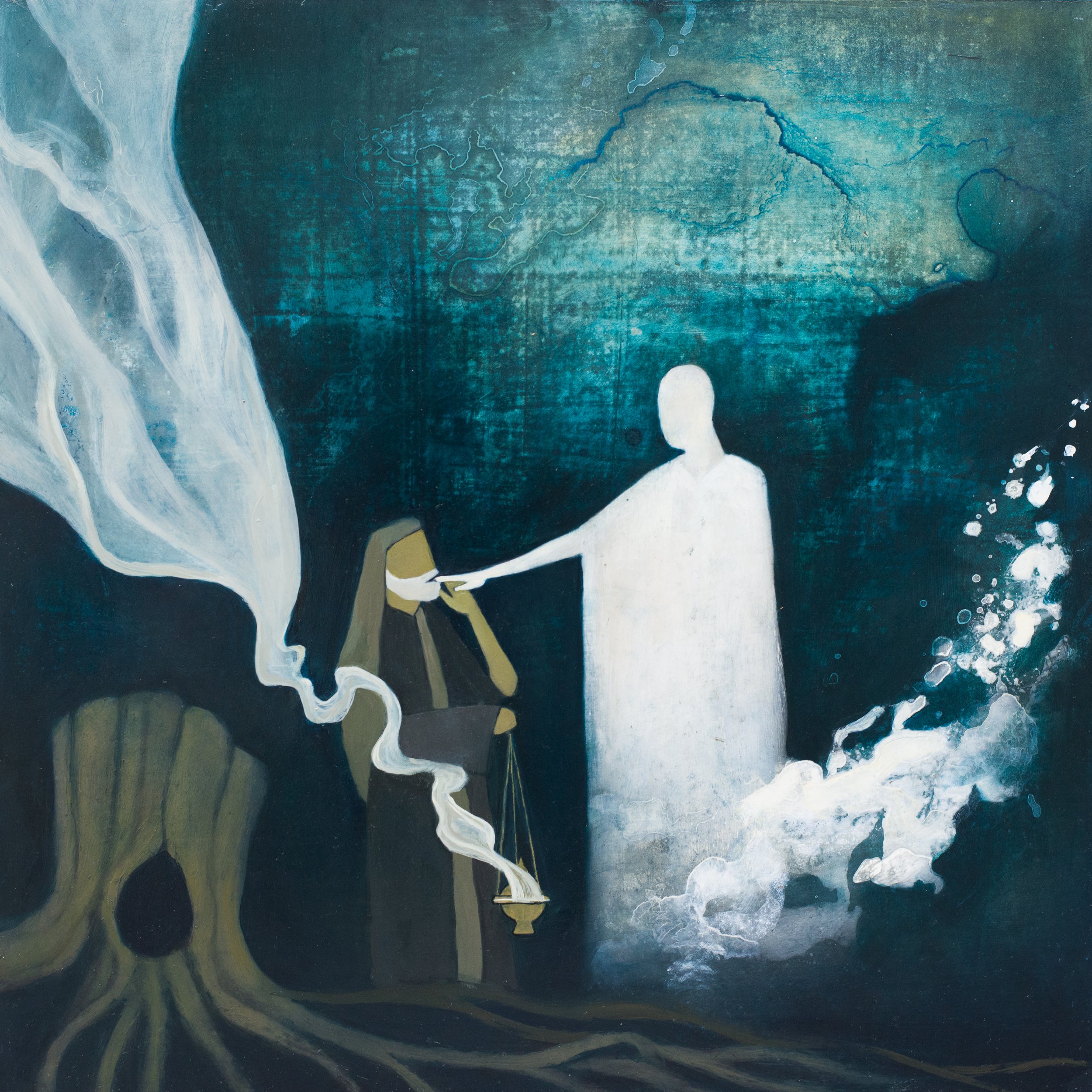
Blog

Breaking Open
Most of what was hard this year was growing pains. God began revealing patterns in my life—ways I learned long ago to navigate people and situations. I became an expert at reading rooms, managing others’ emotions, and avoiding conflict. I learned to placate, pacify, and please. All of these strategies once protected me. But somewhere along the way, I’d made myself small.

Storytelling As An Act of Resistance Against Despair and Discontentment
But the Gospel isn’t just a story about all of us—it’s a story for each of us. For me. For you. The infinite God became intimate when he met me on my dad’s couch after a three-day drug binge. He spoke to me in a way that was undeniable, telling me it was time to get sober. Six years into sobriety, he met me again. This time on my back deck, calling me to surrender and follow Jesus after years of knowing about him but resisting knowing him.
That’s where my personal Dayenu begins. Not in a life well-lived, but in the wreckage of my own choices. Not in slavery to a foreign nation, but in slavery to my own sin and suffering. And that is precisely where God chose to meet me.

Psalm 36 | Spiritual Refugees
Where do you run when the world feels hostile and unsafe?
In a world where wickedness still exists, we desperately need God’s steadfast love to guard us. Psalm 36 is for the weary and worried, for those who wonder if goodness will prevail, and for those who need to remember that our hope rests secure not only in the defeat of evil, but in the overwhelming goodness of who God is.

Borrowed Hope
What do you do when, no matter how hard you try, you can't get to Jesus?
In Mark 2, a paralyzed man's friends literally dug through a roof to get him to Jesus. When the crowd blocked their path, they didn't give up—they got creative. They carried their friend up to the roof and started digging, lowering him down right at Jesus' feet.
Sometimes we need others to carry us when we can't walk on our own.
Hope is communal.

Ego-Maniacs With inferiority complexes
Any attempt to separate pride and insecurity is futile, like splitting hairs. They are intricately interconnected. Insecurity is the fear that we are not enough, not worthy, or will be exposed. And pride is a strategy to protect the self. To hide weakness. To feel significant. To avoid shame. It becomes a shield against the fear of being rejected or humiliated. Both keep us on a spiritual seesaw, our self-perception falling and rising according to the fickle feelings of self and others.

Do You Desire To Become Whole
The full story of Jesus healing the man by the pool of Bethesda (John 5:1-15) raises all kinds of practical and theological questions. Perhaps the question that most piques my curiosity is this: why does Jesus ask a person who has clearly suffered for a long time if he wants to be well? If he wants to be healed? While I know Jesus is purposeful in all he does, this question has always confounded me....
Our answer to his question, which could also be translated as, “Do you want to become whole?” isn’t always a definitive yes, but more like a tentative maybe. More than likely, what we want is relief. Relief from pain, dis-ease, and discomfort that fester from unhealed fractures. We want the fruit of healing and wholeness without all the hard work it can require.
What would it look like to be open to healing instead of settling, striving, and stuffing?

The God of Both/And
"During Jesus’ ministry, he often challenged people’s long-held beliefs and presuppositions. He didn’t fit into their neat theological constructs or comfortable categories. They couldn’t, and sometimes wouldn’t, see beyond their belief systems. As a result, they missed him. Two thousand years later, we’re often still uncomfortable with a God we cannot fully comprehend. But a God we can understand is a God we can control, and a God we can control is a God who is powerless to save.
How do we reconcile a Savior who embodies such complexity—one who brings both peace and conflict? Who offers an easy yoke and demands we take up our cross? Who zealously overturned tables in the temple and also humbly knelt to wash the feet of those who would abandon and betray him? Who forgives sin and also calls us to obedience? Who is meek and mild and also mighty and fearsome? Who is friend and brother and also Lord and King?"

Living In Exile
"I wasn't fired. I was rescued.”
I'll never forget hearing my friend say these words. They marked a significant shift in her thinking. Where she had been stuck in shame and grief, she was emerging with newfound clarity. This kind of insight often happens in hindsight—a gift afforded by time and distance. My friend's new perspective didn't come quickly or easily. It was hard-won, a tooth-and-nail fight for faith. She was bloodied and bruised, but not broken."

Creating Beauty In Bomb Craters
"On September 7, 1996, I awoke on my dad’s couch after a three-day binge. The house was eerily quiet except for the familiar voices of shame and dread taunting me with all I’d done in the previous 72 hours. There was nothing different about that particular morning. But for some reason, God showed up in the middle of my war-torn soul on that day and began to play a melody.
I’d never heard anything like it before. I’ve since come to recognize it as the music of divine interruption, where God’s still, small voice pierces through all the noise. That morning, I heard God say, “You’re done.” It wasn’t an audible voice; it was far more unsettling than that. It came from deep within, and it was undeniable."

The Middle Space
"Our days are occupied with what is, spent in the cosmic in-between. We are holy, and we are not yet holy. We are pure and blameless, and yet we are not. We are more than conquerors, yet we are still subject to this world. We are not what we were, but are not yet what we will be. The gravity of this sin-saturated world pulls us down, but our future is caught up in heaven with Christ, with the Spirit of Christ pulling us evermore into him.
Living in liminal space—what theologians call the now and the not yet—is full of uncertainty and can be very disorienting. It requires us to believe, by faith, that what lies behind us does not define us. Not even our present realities define our futures. Our entire lives are determined by the grand narrative of heaven consistently and persistently breaking through into our earthly realities."

A Year Untethered
"Much of what I learned through powerlessness I already understood cognitively. But living this past year at the mercy of the weather—our minutes, hours, days, and weeks determined by forces far beyond us—gave me tangible opportunities to experience that real freedom comes from surrender. It was not easy. Much of it was thrust upon me, leaving me no choice. Many things did not go according to plan this year. Timelines were stretched and altered—some things I even had to grieve. But when I finally surrendered to my circumstances, I discovered I could be fully present in each moment, embracing both its unexpected gifts and challenges.
Perhaps the greatest paradox of powerlessness is that when we release our grip, we do not find ourselves in a random freefall but held firmly in God's hands."

Foretaste of Heaven
"Just as the ancient Japanese art of kintsugi transforms broken pottery into a beautiful piece of art, God does not minimize our suffering but integrates it into his larger narrative of restoration. Our pain becomes part of our story of healing, not as an open wound but as a healed scar that testifies to survival, grace, and ultimate restoration. On that day, our celebrations will be deeper, our joy more profound, because we will more clearly see how our fractures reveal God’s lavish grace."

Dignity and Depravity
"The Bible offers a complete spiritual diet. But we all come to this feast with our own tastes and preferences (biases), shaped by our personalities, upbringing, culture, social status, and life experiences. These preferences can lead us to fill our plates with only what's familiar, building our spiritual nutrition around a limited menu. The consequences of such selective feeding can be grave. This is true for every biblical doctrine, including our identities."

Hosting The Presence Of Christ
“In John 15, Jesus taught that branches must remain connected to the vine to produce fruit. Likewise, if we are to produce fruit, we need to remain connected to him, the lifegiving vine. This is part of Jesus’ farewell discourse to his disciples, his parting words. And weighing heavily on his heart and mind was the disciples’ need to abide in him.
This message was so important to Jesus that he repeated it ten times. He longed for intimate union and communion with his disciples—for them (and us) to stay connected to him, allowing his love and presence to take up residence in them so that they would produce much fruit (John 15:1-10).
This is what makes hosting the presence of Christ possible. It is a holy calling to spiritual hospitality, offering back to others what we have received. Extending his love and presence through sharing wisdom, forgiveness, mercy, and spiritual gifts, in every conversation we have with a friend or family member.”

Part 3: The Broken and Beautiful Church | Comfort For the wounded
"Your body knows before your mind does.
When I lost my balance during yoga and felt those dizzy spells, my body was telling me something my mind wasn't ready to hear. Years later, I realized this same principle applies to toxic church environments.
Tight chest before staff meetings? Dread before Sunday service? Insomnia after pastoral conversations? These aren't coincidences—they're your body's alarm system.
Your physical and emotional responses deserve curiosity, not dismissal. Sometimes the most obvious truths are the hardest to see."

Part 2: The Broken and Beautiful Church | A Call To Shepherds
"God established the church. He set her apart and called her to be a beacon of hope to the world around her. But the church, like Israel, is also prone to wander from the path God set before her.
Martyn Lloyd-Jones captured this tragic tendency when he warned,
“The church is always to be under the Word; she must be; we must keep her there. You must not assume that because the church started correctly, she will continue so. She did not do so in the New Testament times; she has not done so since. Without being constantly reformed by the Word, the church becomes something very different.”
Many church leaders start with good desires: to share the Gospel, to study the Scriptures, to grow in spiritual maturity, and to serve those in their care. But just because a church started well doesn’t mean it will finish well. It’s far too easy to forget our origins and pattern ourselves after the world around us—worshiping the idols of power, influence, or notoriety. We are vulnerable to pride and the allure of success. When these things continue unchecked, we may find we begin to favor the strong over the weak and vulnerable, elevate and build churches as kingdoms rather than taking the posture of servants, and neglect or mistreat those God has entrusted to us."

Part 1: The Broken and Beautiful Church | “Something isn’t Right?”
The church is both terribly broken and remarkably beautiful, but she is still God’s plan. It can be hard to hold these two truths together at the same time, especially if your spiritual mentors, fathers, mothers, sisters, and brothers have wounded you. This requires willingness and work not to throw the baby out with the bathwater but to test everything and hold on to what is good (1 Thessalonians 5:21). We can honor the church and those who labor for her while also being honest about their sins, weaknesses, and failings. We can forgive and make allowance for one another’s faults while also calling for repentance. We can trust what God is doing through his Church, even when skeptical about the organizations representing her. We can acknowledge and be thankful for the fruit we’ve experienced while always recognizing when weeds begin to choke it out. We can love while also choosing to leave.

Psalm 2 || The Lord Reigns
"Do you ever feel powerless and anxious about the state of our world? Wars, threats of wars, terrorism, corrupt national and international leaders. At times it feels like one big powder keg that could blow at any time. It can be concerning at best and panic-inducing at worst. But Psalm 2 grounds us in a truth that transcends the chaos. It's a message for both the power-hungry and the powerless: the Lord reigns."

Psalm 1 || Rooted In God’s Ways
As we delight in and meditate on God and his instructions, we are transformed, nourished, and sustained. The call to action is to set our minds and hearts on the Lord and his instruction, and the result is that we become like trees planted by streams of water. Healthy trees live long lives. They grow deep, complex root systems embedded beneath the ground surface, which helps them weather wind, storms, and droughts. They can bend and sway when the winds come without being ripped from the ground. This beautiful analogy is meant to teach us that though life brings chaos and turmoil our way, we are not uprooted because we have grown deep in the Lord.

Beholding and Becoming
In beholding God’s love, we are invited to become the beloved. In beholding God’s forgiveness, we are invited to become the forgiven. In beholding God’s mercy, we are invited to become the redeemed. In beholding God’s compassion, we are invited to become the comforted. In beholding God as Father, we are invited to become like little children. We become as we behold.
